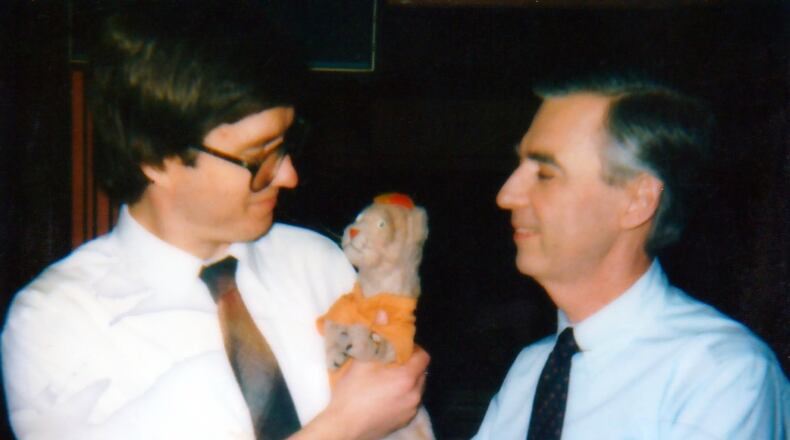Set inside and outside of Mister Rogers’ Neighborhood, it is the tale of a long troubled and alienated family, the Vogels.
It’s true that the family makes peace by film’s end.
But their restoration is the prelude to the funeral of a man who in his final days confesses that he’s just getting a sense of how he should live his life.
As the Vogels’ story unfolds, we learn the sources of the pain and come to appreciate the monumental difficulties involved in overcoming it.
I mentioned last Sunday that I caught an early showing because 35 years ago, I traveled to Pittsburgh to interview Mister Rogers.
MORE FROM TOM STAFFORD: Meeting Mr. Rogers was one of the ‘richest experiences of my life’
The appearance of the movie trailers on television sent me hunting for the two stories I wrote, which I discovered through a microfilm search appeared in the March 11, 1984 edition of the News-Sun.
Those stories fail miserably in reflecting the resounding depths of the man who so deeply affected me. But accurate quotes do, at a minimum, convey some of the essentials of his message.
After watching the movie, two quotes from the story jump off the page at me.
The first is his definition of love.
“To love someone is to strive to accept that person exactly the way he or she is, right here and now - and to go on caring even through times that may bring us pain.”
The second - which appears in the movie as well as my story - is that he considers love to be an active word “like struggle.”
The connection between the two is clear to anyone who has struggled to love another person as doing so has caused the deepest sort of pain.
MORE FROM TOM STAFFORD: Who would you cast in the movie version of the impeachment inquiry
It’s the feeling I associate with having one’s love taken hostage by the person that is loved.
Those struggles and pains are at heart of both the movie and the deepest dramas of our human family.
Early in “Beautiful Day,” the actor playing Bill Isler, the real life administrator of Fred Rogers endeavors, tells Lloyd Vogel, the movie’s troubled journalist, that Rogers “likes people like you.”
Vogel later confesses to the kind of person he is: broken.
The first question that comes to mind, of course, is why Fred Rogers tended to like such people. But let’s put that on momentarily to ask equally important question: How does he love such a person?
“Just the way you are,” as he said during almost every episode he recorded during 30 years of programming.
But notice something here: Rogers does not say he accepts people just the way they are. He says he likes them just the way they are.
And that leads to an explanation of why he likes troubled and broken people.
It’s an explanation one might hope to hear from the ordained minister Rogers was.
As he told me in 1984, “I’m convinced that our souls are accepted and received exactly as we are in the most incredible, loving way. We just don’t have any earthly words to describe it.”
MORE FROM TOM STAFFORD: Springfield organization in 65th year of serving Thanksgiving meal
In short, he sees it as God’s way of loving.
And he wants children to feel loved in that way both because they need it and will live their entire lives among others who need the same thing.
Which requires love.
As he told me in 1984: “To understand ourselves as kindly as we know how helps us grow in kindness toward everyone we meet - our children, our parents, and all other people who long to be accepted exactly as they are.”
All this seems ripe for consideration during a season when multiple faiths celebrate their beliefs and even those without a claim to faith celebrate hope and its promise for humanity.
As a career journalist, I don’t expect to witness a purely beautiful day in the human neighborhood. History is not on our side here.
But the notion that we might move toward that beautiful day by liking our neighbors “just the way they are” reminds me of what I was unable to express about Fred Rogers 35 years ago and that the Tom Hanks movie accomplishes: That while focused on children, he was about much more than child’s play.
Part one of this series was published in the Springfield News-Sun on Dec. 1.
About the Author
